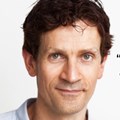Bruce Daisley of Twitter on the power of amazing culture businesses (Part 3)
If you haven’t read Part 1 or Part 2, click below, then continue reading…
He said that for some people, their purpose is just to provide for their family, and that’s such a powerful motivator that it drives them and that gives them the desire to succeed. Other people would actually rather earn less, but be a teacher and feel like they’re having an impact on society. There is evidence though if you're an investment banker and you earn a phenomenal amount of cash but you feel that the work itself is demotivating, that’s linked to depression. One of the other things I’ve seen so much more of, for example, Simon Sinek, I don't know if you saw his video about the why and it's about purpose, I think purpose is such a tricky thing to get your head around, because someone’s purpose might be about charity while someone else's purpose might be just the thought of excellent execution of what they're doing. What is your view on the whole space of purpose?
One of the other things I’ve seen so much more of, for example, Simon Sinek, I don't know if you saw his video about the why and it's about purpose, I think purpose is such a tricky thing to get your head around, because someone’s purpose might be about charity while someone else's purpose might be just the thought of excellent execution of what they're doing. What is your view on the whole space of purpose?
I’ve chatted to Daniel Pink, who has written a fabulous book called Drive, about the three secrets of motivation at work as purpose, mastery and autonomy, and I asked him about purpose. I said, ‘is purpose this small ‘p’ thing, where you’re trying to put food on the table of your family home or is it this big ‘P’ thing where you're trying to change the world?’ He said it’s a bit of both, actually.
So, any of us finding ourselves feeling like we’re working because this is a disproportionate amount of cash but we could do it for a small amount of a time, a few of us find ourselves doing a job thinking ‘two more years, two more years’. The evidence is that this does lead to depression, so probably you want to hold firm and if you're telling yourself ‘two more years’, you should probably stick to just two more years, because it does lead to depression.
They said they would much rather people got a full day’s work done, went home and had a passion project that they worked on or that they had a hobby that was an all-consuming hobby, where they were fanatical about surfing or fanatical about guitar playing, because it tended to be that ‘side hustle’ as I think we’ve started to call it now, would cross-pollinate and would lead to them being more energised and creative in their jobs. So I think that we’re starting to see a little bit of that rather than the notion that a great worker needs to works until 11pm every night. Super interesting and I think that's an interesting segue to talk about well-being. As you say, there’s been such a shift and I think recently there was this ‘work yourself to the bone’ type of McKinsey consultant approach and what I find interesting is that there definitely seems to be a resurgence around ‘look after yourself’. I’m not sure if you've seen Tim Ferriss’ latest book called Tribe of Mentors, but it’s interesting where he asks a lot of people different questions about how they’re dealing with different things and literally the one I read last night, he said that he's divided his life into three things. One of them is work, one of them is family and one of them is himself and he says he spends the time equally across those three things. I'm a new dad of two little kids and so that makes no sense in the world to me because work, kids – there is no more space. But I think carving out that space for yourself, it would be interesting to hear how you manage to do it and obviously you must have massive demands on your time. Do you manage in your mind to look after yourself well enough, and how do you juggle all those things?
Super interesting and I think that's an interesting segue to talk about well-being. As you say, there’s been such a shift and I think recently there was this ‘work yourself to the bone’ type of McKinsey consultant approach and what I find interesting is that there definitely seems to be a resurgence around ‘look after yourself’. I’m not sure if you've seen Tim Ferriss’ latest book called Tribe of Mentors, but it’s interesting where he asks a lot of people different questions about how they’re dealing with different things and literally the one I read last night, he said that he's divided his life into three things. One of them is work, one of them is family and one of them is himself and he says he spends the time equally across those three things. I'm a new dad of two little kids and so that makes no sense in the world to me because work, kids – there is no more space. But I think carving out that space for yourself, it would be interesting to hear how you manage to do it and obviously you must have massive demands on your time. Do you manage in your mind to look after yourself well enough, and how do you juggle all those things?
The most important thing for my mental health is running so I run to work every day and I do 10.6 miles every day. By doing that, I find that I can cope with everything else, but what I’ve also found is the interesting thing I was hearing about Slack. Slack has no table football in the office, they have nothing to entertain people, and I’ve heard from the founders of Slack’s philosophy was for people to leave work and to have side interests.
The idea is that actually the most rounded creative and thoughtful workers are often the ones that have got other things going on in their lives.
So Brian Eno gave this lecture and he said he sat behind two old pensioners on a bus and heard them talking about a TV soap opera, discussing their opinions on it and he said they were effectively using it as a means to synchronise themselves in their thoughts and I was really taken with this idea that sometimes, connecting with each other doesn't necessarily have to be about focussing on PowerPoint. Very interesting. You spoke earlier about the power of laughter for yourself, and you said that it has power in your team as well. One of the things that springs to mind there is, how can you be deliberate about increasing laughter in your office? Is that partly how you lead your team and how you show up and that you're still open for that sort of banter? Is there anything else deliberate you can do to create more happiness in the workplace?
Very interesting. You spoke earlier about the power of laughter for yourself, and you said that it has power in your team as well. One of the things that springs to mind there is, how can you be deliberate about increasing laughter in your office? Is that partly how you lead your team and how you show up and that you're still open for that sort of banter? Is there anything else deliberate you can do to create more happiness in the workplace?
I’m really interested in the idea of – I’ll use the phrase, and I'm not sure if this is the right phrase for it – but synchronisation. By that I mean people all feel connected to each other in an empathetic way. So where it comes from, I was listening to a Brian Eno lecture, the famous music producer who produced multiple David Bowie albums and actually became famous as being a go-to person where an artist was looking to try and read all their creativity. He was the person that people went to.
I then found myself chatting to a few different businesses and one business said to me that they have this 9am Monday meeting, which doesn’t have a lot of an agenda, often is filled with chatter and laughter about the things that happened and then later in the week, they have an afternoon where they all share snacks and she said it’s called Crisp Thursday.
Everyone gets together for this chat over the boardroom table, everyone shares snacks. And when a new boss came in, the new boss said, ‘I don't understand this. It doesn't feel very productive. We might get rid of it.’ And she said it's strange because it was such an important part of everyone feeling that they were connecting to each other, that often they would have discussions about other things. It felt like they had actually achieved something but no one could measure what it was.
For me, this is one of the things that we are crushing out of working environments. Most meetings we now have are heavily agenda-driven, they love PowerPoint, there's not a lot of time for discussion and chat and synchronisation. We’re sort of filling every minute with what we think is productive, and the danger of that is that actually, even though we couldn’t measure it, all of that synchronisation is immensely productive.
It helps us align with each other outside creativity, but we’re squeezing it out. So you know, for me laughter is one of the ways to do that and finding time in meetings that sometimes seems unnecessary, and superfluous or unproductive and that chat, with people just connecting with each other in an almost social way, has far bigger benefits than we’ve even realised yet.
 A lot of our readers while they're there at university and looking at your career, it feels like a great one to want to aspire to. What advice would you give to young students who are about to enter this industry, which seems to be changing so much at the moment? I think it's almost like what happened in the last year in terms of change across all the different platforms that matter for marketing and technology and advertising is almost as much as has happened in the previous five years. What advice would you have for these guys entering this space?
A lot of our readers while they're there at university and looking at your career, it feels like a great one to want to aspire to. What advice would you give to young students who are about to enter this industry, which seems to be changing so much at the moment? I think it's almost like what happened in the last year in terms of change across all the different platforms that matter for marketing and technology and advertising is almost as much as has happened in the previous five years. What advice would you have for these guys entering this space?
The thing that I found, my own experience was such that often, getting people's attention is a lot easier than you think. So I always say to school kids, ‘I don't know who your mum and dad are, but never get your mum and dad to write a letter about work experience’. Because irrespective of who your mum and dad is, I work on the basis that I had no one who could write me a letter, I had no one who could leverage anything. But you know I get zero postal letters ever at Twitter, so when a letter that does arrive has been thoughtfully prepared, it really stands out there. I got my first job in radio by drawing a full-page cartoon resume of myself and sent that to a handful of people.
People phoned me, wrote to me, were euphoric about it, saying ‘This is incredible, I would love to meet you.’ Now I think well, at the time I had nothing to draw upon or network, but I managed to get people's attention. Quite often, people have sent me videos they’ve made, or they've sent me different things that show the work that they've done. And it's much easier to get people's attention than you think.
So my advice to anyone would be, think about how you can promote or produce a moment of interest in someone's day. Think about how you can produce a moment of stimulation. Those things are a good starting point, because if you’re sitting there thinking, ‘OK, so I want to go and work for Google.’ You and I both know it’s a very regimented recruitment process at Google. But it is massively enhanced if you've got someone who knows you who's on the inside, who can help you navigate that.
So if you can grab someone’s attention, it doesn't just feel like you're asking for a coffee with them with no quid pro quo. You’ve entertained them or amused them or provided some reason why they are backing you, these things are definitely achievable. So my LinkedIn is open and if people immediately say, ‘Bruce hi, can I buy you a coffee,’ well, look: I get a lot of offers from people to buy me coffee and I'm unlikely to do it straight away, but if people say, ‘Hi, I've been thinking about this,’ and then get you in a discussion, or they reference something they saw you do, or they ask your opinion on something, you’re more likely to end up having a coffee with that person because you’ve invested in the discussion, the ongoing dialogue.
I think when people send a LinkedIn or an email asking, ‘Will you meet me next week for coffee on Thursday or Friday,’ that's not going to happen, because they haven’t built a relationship. It’s like trying to go immediately out on a date with someone, without trying to cultivate a discussion first.
The state of consumption is that the person's exhausted, they can't tell the difference, they don't know what they’re looking for. They often latch on to one or two things as a ‘yes’ or a ‘no’. So hopefully the reason why my cartoon CV worked is that it empathised with ‘message received’, it empathised that the person was tired and thought, ‘That one looks a bit different.’ Certainly, my own experience mirrors that perfectly. I don't think I ever got a job without some form of having met someone who has the inside track as you described it now, so that makes a lot of sense. I think that's amazing advice, especially because as a company, we get a lot of CVs and it surprises me that they’re just CVs. To your point, it's sort of a CV on its own, unless it's the best CV ever with distinctions all over it…
Certainly, my own experience mirrors that perfectly. I don't think I ever got a job without some form of having met someone who has the inside track as you described it now, so that makes a lot of sense. I think that's amazing advice, especially because as a company, we get a lot of CVs and it surprises me that they’re just CVs. To your point, it's sort of a CV on its own, unless it's the best CV ever with distinctions all over it…
Everyone forgets when they're putting together their CV that someone will not be studying it. Most CVs are consumed by someone who's exhausted, and already read 40 CVs. So you come to the next CV and it all seems like a jumble of sameness, like ‘I've seen all of this in all of the other CVs.’ It’s remarkable. And people forget because they’re in the position when they wrote the CV, thinking their CV is special. I always talk about the message sent and message received. Message sent might be ‘I think my CV is amazing.’ But you’ve got to think about the state of consumption.
I also always used to send my covering letters on yellow paper. A trivial difference, but at least if it was in a pile of identical post in front of someone, this one looked one percent different.
My feeling is, that’s even truer than ever before. The scarcity at the moment is attention, everyone feels that they’ve got too much to do and so something that makes your letter rewarding or interesting… I was chatting with a kid I know who is trying to work at a recording studio, and I said, ‘Take a pack of Polaroid film, take a photograph of a cup of coffee cup or tea, and send it to every recording studio, saying I make the best tea in the country.’
Because they probably get loads of letters. But if you say, ‘I know what my position in the hierarchy is’, with a bit of humour, there’s a chance someone’s going to at least read it. The challenge is, normally what would happen in that situation is someone would say, ‘I’ve got to write a letter to a recording studio. Well, I need to say everything I've done.’ So it becomes this four-page letter, and with the best will in the world, no one will read that letter. You’re looking for work experience, kid. To make that tea. So someone who appears to get that and empathetically communicate that, to me, those things still cut through.
 My last question then. At the end of it all, what you think you'd like to be remembered for, for your time on the planet? Big question!
My last question then. At the end of it all, what you think you'd like to be remembered for, for your time on the planet? Big question!
Someone said to me recently, someone asked a group in a room, to write down all of their great-grandparents’ names. And the room was like completely paralysed with this lack of knowledge. And he said, there's the point. No one remembers anyone. These are in your own bloodline, the DNA of these people entirely made up who you are today, and you don't remember them. So stop worrying too much about legacy and try and focus on having an immediate impact on some of the things that are forgotten in a moment.
So the end result of that is, try to spend more time with friends, try and spend more time on the things that might seem more fleeting but actually probably have a big impact on the people around you.
 Awesome awesome, Bruce this has been such a great hour of your time, thank you so much. I really do owe you one.
Awesome awesome, Bruce this has been such a great hour of your time, thank you so much. I really do owe you one.
Good to chat to you. You’re an example of this, Jon. You invited me to speak somewhere, and then because of that connection I ended up putting your name in for a job at Google, so you’re the embodiment of the incremental steps and the way that we can build our network. Anyone can do it.
 I was going to say but I didn't want to make the story about me, but that is exactly what happened, and I'd say probably the most fundamental change in my life, because of that, because you said ‘yes’ to saying a speech, because I got the job at Google. That was such a massive shift in my trajectory and I say thank you again for that.
I was going to say but I didn't want to make the story about me, but that is exactly what happened, and I'd say probably the most fundamental change in my life, because of that, because you said ‘yes’ to saying a speech, because I got the job at Google. That was such a massive shift in my trajectory and I say thank you again for that.
Follow Daisley on Twitter for more and click here to listen in to the Eat Sleep Work Repeat podcast.














